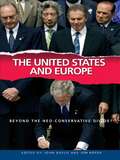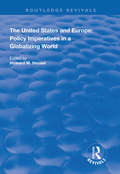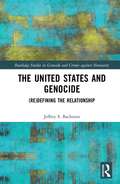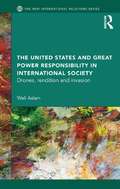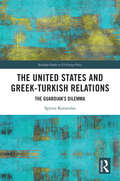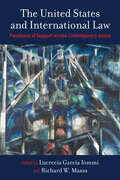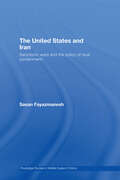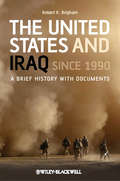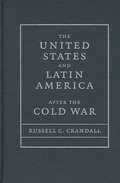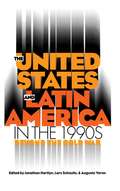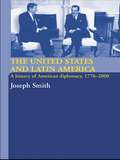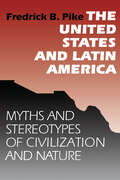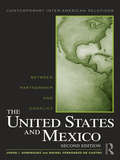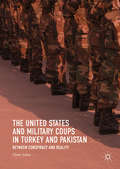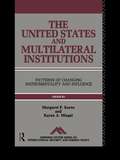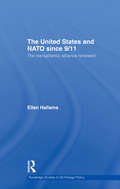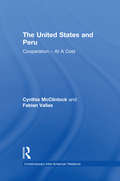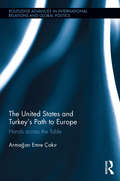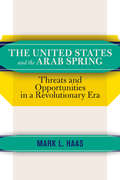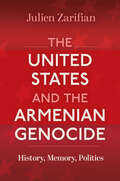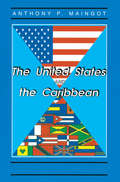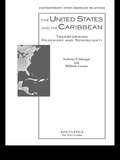- Table View
- List View
The United States and Europe: Beyond the Neo-Conservative Divide? (Contemporary Security Studies)
by Jon Roper John BaylisA penetrating new examination of the triangular political and cultural relationship between America, Britain, and continental Europe. This relationship is both fraught and dynamic. Post-war reconstruction of Europe brought integration. Creating a ‘United States of Europe’ was a goal shared by many Americans. Yet the contemporary 'War on Terror', has redefined relationships between America, Britain, 'old' and 'new' Europe. For Britain, the Channel seems wider than the Atlantic, although geopolitically it is part of Europe. This book brings together experts from Britain, Europe and America to explore the complexities of contemporary cultural and political relationships, considering the challenges that have been met and those that have to be faced.
The United States and Europe: Policy Imperatives In A Globalizing World (Global Interdisciplinary Studies)
by Howard M. HenselThis title was first published in 2002. This provocative volume explores key aspects of the contemporary relationship between the United States and the European powers as they attempt to address common issues as the international community enters a new millennium. Representing diverse perspectives, opinions, analyses and recommendations regarding the regional and global problems and opportunities confronted by both the United States and the Europeans, the book is particularly suitable for scholars and policy makers alike who contribute to ongoing discussions concerning this critical relationship.
The United States and Fascist Italy
by Gian Giacomo Migone Molly Tambor Gian Giacomo Migone Molly TamborOriginally published in Italian in 1980, Gli Stati Uniti e il fascismo: Alle origini dell'egemonia Americana in Italia is regarded today as a crucial text on the relationship between the United States and Italy during the interwar years. Aside from the addition of two new prefaces - one by the author and one by the book's translator, Molly Tambor - the original text has remained unchanged, so that Anglophone readers now have the opportunity to engage with this classic work. By analyzing the enduring relationship between the United States - especially its financial establishment - and fascist Italy up until Mussolini's conquest of Ethiopia in 1935, this book provides answers to some key questions about the interconnectedness of America's rise to hegemonic global financial power in the twentieth century and its support of Italian fascism during this time.
The United States and Genocide: (Re)Defining the Relationship (Routledge Studies in Genocide and Crimes against Humanity)
by Jeffrey S. BachmanThere exists a dominant narrative that essentially defines the US’ relationship with genocide through what the US has failed to do to stop or prevent genocide, rather than through how its actions have contributed to the commission of genocide. This narrative acts to conceal the true nature of the US’ relationship with many of the governments that have committed genocide since the Holocaust, as well as the US’ own actions. In response, this book challenges the dominant narrative through a comprehensive analysis of the US’ relationship with genocide. The analysis is situated within the broader genocide studies literature, while emphasizing the role of state responsibility for the commission of genocide and the crime’s ancillary acts. The book addresses how a culture of impunity contributes to the resiliency of the dominant narrative in the face of considerable evidence that challenges it. Bachman’s narrative presents a far darker relationship between the US and genocide, one that has developed from the start of the Genocide Convention’s negotiations and has extended all the way to present day, as can be seen in the relationships the US maintains with potentially genocidal regimes, from Saudi Arabia to Myanmar. This book will be of interest to scholars, postgraduates, and students of genocide studies, US foreign policy, and human rights. A secondary readership may be found in those who study international law and international relations.
The United States and Great Power Responsibility in International Society: Drones, Rendition and Invasion (New International Relations)
by Wali AslamThis book evaluates American foreign policy actions from the perspective of great power responsibility, with three case studies: Operation Iraqi Freedom, American drone strikes in Pakistan and the post- 9/11 practice of extraordinary rendition. This book argues that the US invasion of Iraq in 2003, American drone attacks in Pakistan and the practice of extraordinary rendition are the examples of irresponsible actions undertaken by the U.S. acting as a great power in international society. Focusing on a major theoretical approach of International Relations, the English School, this book considers the responsibilities of great powers in international society. It points to three obligations of great powers: to act according to the norm of legality, to act according to the norm of legitimacy, and to adhere to the principles of prudence. The author applies the criteria of legality, legitimacy and prudence, to analyse the three foreign policy endeavours of the U.S., and, developing a normative framework, clarifies the implications for future U.S. foreign policy. This book will be of strong interest to students and scholars of international relations, international relations theory, American politics, foreign policy studies, international law, South Asian studies and Middle Eastern studies.
The United States and Greek-Turkish Relations: The Guardian’s Dilemma (Routledge Studies in US Foreign Policy)
by Spyros KatsoulasThis book examines the role of the United States in Greek–Turkish relations and fills an important gap in alliance theory regarding the guardian’s dilemma. The strategy of a great power involves not only tackling threats from enemies, but also dealing with problems that arise between allies. Every time Greece and Turkey threatened to go to war against each other, the United States had to effectively restrain its two strategic allies without straining relations with either one of them. This book explores how the United States responded to the guardian’s dilemma in six crises during the Cold War, pursuing a policy of dual restraint to prevent an intra-alliance conflict, mitigate the consequences of each crisis, and maintain effective control of the Rimland Bridge. From a neoclassical-realist standpoint, the book examines how the United States responded to each Greek–Turkish crisis, for what reasons, and with what results. It will be of interest to scholars of foreign policy, security studies, geopolitics, and international relations.
The United States and International Law: Paradoxes of Support across Contemporary Issues
by Lucrecia García Iommi Richard W MaassThe United States spearheaded the creation of many international organizations and treaties after World War II and maintains a strong record of compliance across several issue areas, yet it also refuses to ratify major international conventions like the UN Convention on the Law of the Sea and the Convention on the Elimination of All Forms of Discrimination Against Women. Why does the U.S. often seem to support international law in one way while neglecting or even violating it in another? The United States and International Law: Paradoxes of Support across Contemporary Issues analyzes the seemingly inconsistent U.S. relationship with international law by identifying five types of state support for international law: leadership, consent, internalization, compliance, and enforcement. Each follows different logics and entails unique costs and incentives. Accordingly, the fact that a state engages in one form of support does not presuppose that it will do so across the board. This volume examines how and why the U.S. has engaged in each form of support across twelve issue areas that are central to 20th- and 21st-century U.S. foreign policy: conquest, world courts, war, nuclear proliferation, trade, human rights, war crimes, torture, targeted killing, maritime law, the environment, and cybersecurity. In addition to offering rich substantive discussions of U.S. foreign policy, their findings reveal patterns across the U.S. relationship with international law that shed light on behavior that often seems paradoxical at best, hypocritical at worst. The results help us understand why the United States engages with international law as it does, the legacies of the Trump administration, and what we should expect from the United States under the Biden administration and beyond.
The United States and Iran: Sanctions, Wars and the Policy of Dual Containment (Routledge Studies in Middle Eastern Politics)
by Sasan FayazmaneshWhen and why did the United States policy of containment of Iran come about? How did it evolve? Where is it going? Much has been said about the US policy of dual containment, particularly as it pertains to Iraq. However, there has been little in-depth analysis of this policy when it comes to Iran. Sasan Fayazmanesh explores this often neglected subject by analyzing the history of this policy. The analysis includes the role that the Carter and Reagan Administrations played in the Iran-Iraq war, the numerous sanctions imposed on Iran by the Clinton Administration and the aggressive and confrontational policy toward Iran adopted by the George W. Bush Administration after the events of September 11, 2001. This topical read synthesises a range of primary sources, including firsthand reports, newspaper articles and electronic media, and presents a coherent analysis of the ebbs and flows in the US thinking on Iran and Iraq.
The United States and Iraq Since 1990
by Robert K. BrighamThis book offers a concise history of US policy in Iraq since 1990 and how it has evolved over two decades. Examines US relations with Iraq from both a regional and international perspective Argues that the only way to clearly understand US policy toward Iraq is to see it in its proper historical context and within a transnational framework Uses recently declassified documents at the end of each chapter to illustrate US decision-making in the wars for Iraq Addresses the importance of the changing domestic climate surrounding two decades
The United States and Latin America after the Cold War
by Russell CrandallIn this book, Crandall examines the policies of three post-Cold War presidential administrations through the prism of three critical areas: democracy, economics, and security. He argues that any lasting analysis must be viewed through a fresh framework that allows for the often unexpected episodes and outcomes in U.S.-Latin American relations.
The United States and Latin America in the 1990s
by Lars Schoultz Augusto Varas Jonathan HartlynA comprehensive examination of both unresolved tensions in inter-American relations and the specific problems facing U.S. and Latin American policymakers in the 1990s.--American Political Science Review "These well-integrated essays analyze the key issues in contemporary inter-American relations very clearly. The authors address their themes with subtlety and insight, in this first overall assessment of North-South relations in the Western Hemisphere during the post-Cold War period.--Christopher Mitchell, New York University "A superb contribution. . . . At a time when U.S.-Latin American relations face a critical turning point, policymakers would benefit from a careful reading of this fine book.--Eduardo A. Gamarra, Florida International University
The United States and Latin America: A History of American Diplomacy, 1776-2000
by Joseph SmithProviding a concise, balanced and incisive analysis of US diplomatic relations with Latin America from 1776 to the end of the twentieth century, this timely work explores central themes such as the structure of international relations, and the pursuit of American national interest by the use of diplomacy, cultural imperialism and economic and military power. Joseph Smith examines: * the rise of the USA as an independent power* its policy towards Latin-American movements for independence* the evolution of the Monroe Doctrine* pan-Americanism* dollar diplomacy* the challenge of communism. Highlighting Latin American responses to US policy over a significant time span, the study documents the development of a complex historical relationship in which the United States has claimed a pre-eminent role, arousing as much resentment as acquiescence from its southern neighbours.Including a timely discussion of the current issues of debt, trade and narcotics control, this unique and valuable study will be of interest to all those with an interest in US and Latin American international relations.
The United States and Latin America: Myths and Stereotypes of Civilization and Nature
by Fredrick B. PikeThe lazy greaser asleep under a sombrero and the avaricious gringo with money-stuffed pockets are only two of the negative stereotypes that North Americans and Latin Americans have cherished during several centuries of mutual misunderstanding. This unique study probes the origins of these stereotypes and myths and explores how they have shaped North American impressions of Latin America from the time of the Pilgrims up to the end of the twentieth century. Fredrick Pike's central thesis is that North Americans have identified themselves with "civilization" in all its manifestations, while viewing Latin Americans as hopelessly trapped in primitivism, the victims of nature rather than its masters. He shows how this civilization-nature duality arose from the first European settlers' perception that nature—and everything identified with it, including American Indians, African slaves, all women, and all children—was something to be conquered and dominated. This myth eventually came to color the North American establishment view of both immigrants to the United States and all our neighbors to the south.
The United States and Mexico: Between Partnership and Conflict
by Rafael Fernández de Castro Jorge I. DomínguezBy sharing one of the longest land borders in the world, the United States and Mexico will always have a special relationship. In the early twenty-first century, they are as important to one another as ever before with a vital trade partnership and often-tense migration positions. The ideal introduction to U.S.-Mexican relations, this book moves from conflicts all through the nineteenth century up to contemporary democratic elections in Mexico. Domínguez and Fernández de Castro deftly trace the path of the relationship between these North American neighbors from bloody conflicts to (wary) partnership. By covering immigration, drug trafficking, NAFTA, democracy, environmental problems, and economic instability, the second edition of The United States and Mexico provides a thorough look back and an informed vision of the future.
The United States and Military Coups in Turkey and Pakistan: Between Conspiracy and Reality
by Ömer AslanThis comparative study explores the involvement of the United States in four successful military coups in Turkey and Pakistan during the Cold War. Focusing on military-to-military relations with the US in each country, the book offers insight into how external actors can impact the outcomes of coups, particularly through socialization via military training, education, and international organizations such as NATO. Drawing upon recently declassified government documents and a trove of unexplored interviews with high-ranking officials, Ömer Aslan also examines how coup plotters in both countries approached the issue of US reaction before, during, and after their coups. As armed forces have continued to make and unmake Turkish and Pakistani governments well into the twenty-first century, this volume offers original, probing analysis of the circumstances which make coups possible.
The United States and Multilateral Institutions: Patterns of Changing Instrumentality and Influence
by Karen A. Mingst Margaret P. KarnsWorld politics in the post-Cold War world has become increasingly institutionalized. However, the role of international organizations has been overlooked in much of the literature on international regimes. Now in paperback, The United States and Multilateral Institutions examines United States policy in areas ranging from international trade to human rights, and in institutions such as the International Monetary Fund (IMF), GATT and the World Health Organization.
The United States and NATO since 9/11: The Transatlantic Alliance Renewed (Routledge Studies in US Foreign Policy)
by Ellen HallamsThe US decision not to work through NATO after 9/11 left many European members of the alliance feeling deflated. This decision reflected not only the unilateralism of the Bush Administration, but also the belief that US operational freedom and flexibility had been hampered during NATO's two Balkans interventions. This book examines US attitudes to, and perspectives on, the transatlantic alliance, with a particular focus on US-NATO relations since 9/11. It demonstrates that, following the decision to bypass NATO after 9/11, the Bush Administration's perceptions of the alliance shifted due to a belated recognition that NATO did indeed have much to offer the US. Hallams explores NATO's contributions to post-combat reconstruction and stabilisation operations in Afghanistan and Iraq, and argues that the events of 9/11 galvanised NATO into undertaking an accelerated program of transformation that has done much to reinvigorate the alliance. This book offers an optimistic assessment of the transatlantic alliance, counter-balanced by realistic reflections on the problems it faces. Drawing on interviews with US and NATO officials, it argues that NATO is far from irrelevant and that prospects for the alliance remain fundamentally positive; it will be of interest to students and scholars of US Foreign Policy, American politics, international relations, security studies and transatlantic studies.
The United States and Peru: Cooperation -- At A Cost
by Cynthia McClintock Fabian VallasThe early 1990s marked a critical turning point in the relationship between the United States and Peru. Prior to the election of Albert Fujimori in 1990, the relationship between governments had been contentious. Fujimori, however, sought to work together with the United States regarding issues such as security threats, free-market reform and narcotics control. Yet even with this new spirit of cooperation, the two governments still clashed over international standards of democracy and human rights at a time when most Latin American countries were much more democratic. This work traces the relationship between the two countries from 1990-2000, examining political and military issues, including drug trafficking, guerrillas, human rights violations and the US role in the 1995 war between Peru and Ecuador.
The United States and Turkey's Path to Europe: Hands across the Table (Routledge Advances in International Relations and Global Politics)
by Armağan Emre ÇakırTurkey’s relations with the European Union is one of the most enigmatic topics in the European Studies literature. This country, kept at bay by Europeans for centuries, once came unexpectedly close to full-membership. The progress Turkey recorded in its European quest is difficult to account for with either Turkey’s performance or the positive attitude of the Europeans towards Turkey. In this book, Armağan Emre Çakır chronicles over six decades of US involvement in EU-Turkey relations. Shedding new light on the reasons, characteristics, transformation and relative importance of the US influence on Turkey-EU relations, he argues that Turkey’s quest for EU membership would not have advanced this far without the support from the United States. Çakır’s hypotheses and findings are grounded in original research that, among other things, includes interviews conducted on both sides of the Atlantic with key players, archival material and newspaper articles. The valuable insights presented in this book make for a much needed alternative history of this volatile relationship.
The United States and the Arab Spring
by Mark L. HaasIn this Westview Press Spotlight, Mark L. Haas explores the major political consequences of the Arab Spring protests in North Africa and the Middle East as well as how and why US leaders responded to these developments. A detailed examination of the threats and opportunities to US interests created by the uprisings are prominent in the analysis of the events. Students will learn about the individual protests and aftermath of the Arab Spring as well as the various policies the United States might adopt to best advance US security in the new international environment. The United States and the Arab Spring is an extracted chapter from the 2013 Updated Edition of The Middle East and the United States, Fifth Edition (ISBN 978-0-8133-4914-5), edited by regional experts David W. Lesch and Mark L. Haas. In the full-length edition of the text, scholars and diplomats from the Middle East, Europe, and North America provide an objective, cross-cultural assessment of U. S. policy toward the Middle East and Middle Eastern political history from the First World War through the present.
The United States and the Arab Spring
by Mark L. HaasIn this Westview Press Spotlight, Mark L. Haas explores the major political consequences of the Arab Spring protests in North Africa and the Middle East as well as how and why US leaders responded to these developments. A detailed examination of the threats and opportunities to US interests created by the uprisings are prominent in the analysis of the events. Students will learn about the individual protests and aftermath of the Arab Spring as well as the various policies the United States might adopt to best advance US security in the new international environment.The United States and the Arab Spring is an extracted chapter from the Updated 2013 Edition of The Middle East and the United States, Fifth Edition (ISBN 978-0-8133-4914-5), edited by regional experts David W. Lesch and Mark L. Haas. In the full-length edition of the text, scholars and diplomats from the Middle East, Europe, and North America provide an objective, cross-cultural assessment of US policy toward the Middle East and Middle Eastern political history from the First World War through the present.
The United States and the Arab Spring: Threats and Opportunities in a Revolutionary Era (Westview Press Spotlight Ser.)
by Mark L. HaasIn this Westview Press Spotlight, Mark L. Haas explores the major political consequences of the Arab Spring protests in North Africa and the Middle East as well as how and why US leaders responded to these developments. A detailed examination of the threats and opportunities to US interests created by the uprisings are prominent in the analysis of the events. Students will learn about the individual protests and aftermath of the Arab Spring as well as the various policies the United States might adopt to best advance US security in the new international environment. The United States and the Arab Spring is an extracted chapter from the 2013 Updated Edition of The Middle East and the United States, Fifth Edition, edited by regional experts David W. Lesch and Mark L. Haas. In the full-length edition of the text, scholars and diplomats from the Middle East, Europe, and North America provide an objective, cross-cultural assessment of U.S. policy toward the Middle East and Middle Eastern political history from the First World War through the present.
The United States and the Armenian Genocide: History, Memory, Politics (Genocide, Political Violence, Human Rights)
by Julien ZarifianDuring the first World War, over a million Armenians were killed as Ottoman Turks embarked on a bloody campaign of ethnic cleansing. Scholars have long described these massacres as genocide, one of Hitler’s prime inspirations for the Holocaust, yet the United States did not officially recognize the Armenian Genocide until 2021. This is the first book to examine how and why the United States refused to acknowledge the Armenian Genocide until the early 2020s. Although the American government expressed sympathy towards the plight of the Armenians in the 1910s and 1920s, historian Julien Zarifian explores how, from the 1960s, a set of geopolitical and institutional factors soon led the United States to adopt a policy of genocide non-recognition which it would cling to for over fifty years, through Republican and Democratic administrations alike. He describes the forces on each side of this issue: activists from the US Armenian diaspora and their allies, challenging Cold War statesmen worried about alienating NATO ally Turkey and dealing with a widespread American reluctance to directly confront the horrors of the past. Drawing from congressional records, rare newspapers, and interviews with lobbyists and decision-makers, he reveals how genocide recognition became such a complex, politically sensitive issue.
The United States and the Caribbean: Challenges of an Asymmetrical Relationship (Warwick University Caribbean Studies)
by Anthony Maingot<p>This book explores the complex interdependence between the small Caribbean states and the United States and looks at their changing relationships throughout history. The main difficulty for the small state is to discern where and when synergies may be found in its relations with more powerful states—in this case, the United States. The need for cooperation among the less powerful states, for sharing interests and values, must be combined with respect on both sides for democratic and human rights. <p>The author traces the history of these relationships from 1823 to the end of the Cold War, then examines the U.S. response to the Marxist challenge. He then turns to an investigation of different aspects of modern Caribbean relations, such as the problems of drug trafficking, offshore interests, and migration. The book concludes with a discussion on the limits to sovereignty and the challenges that have evolved in U.S.-Caribbean studies.
The United States and the Caribbean: Transforming Hegemony and Sovereignty
by Anthony P. Maingot Wilfredo LozanoThis volume provides the first comprehensive assessment of post-Cold War US-Caribbean relations. Focusing on Haiti, the Dominican Republic and Trinidad-Tobago, the book looks at the political history of the region during the Cold War years, the region's current political economy, international security, and issues of migration and crime. Spanning the Caribbean's linguistic and cultural sub regions (Spanish, French, English, and Dutch) it calls attention to the achievements, setbacks, and concerns that are common to the region. The United States and the Caribbean will be of interest to students and scholars of economics, geography and politics and international relations in general.
